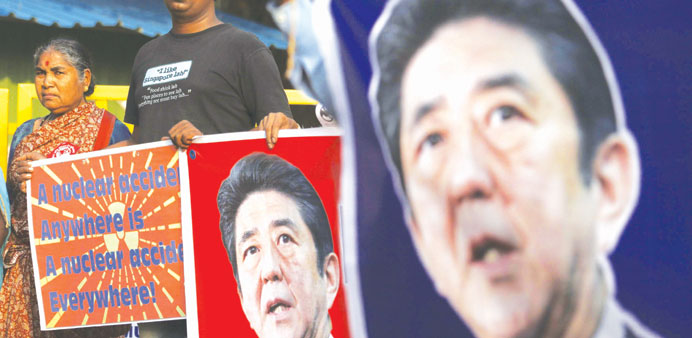|
Japanese Prime Minister Shinzo Abe visits India this weekend, hoping to wrap up the first overseas sale of military equipment by Tokyo in nearly four decades and open up the world’s biggest arms market for his nation’s defence manufacturers. |
Abe’s visit to India will underline growing business and political ties between the two nations as they close ranks against mutual rival China, with the initial focus on the sale of amphibious search and rescue aircraft to India.
Japan and India are also trying to finalise an agreement on civilian nuclear energy that would open up the Indian market to Japanese players, officials said, reflecting another shift in Tokyo’s policy on a sensitive issue.
However, a Japanese official said a signing was unlikely during the visit.
Japanese officials say the proposed sale of ShinMaywa US-2i planes would not infringe Japan’s self-imposed ban on arms exports because the aircraft to be given to India will be unarmed and can be used for civilian purposes.
Still, it will give India considerable aviation reach across the seas and could raise China’s ire. “We have been discussing with Japan the possibility of purchase of the aircraft,” said Gautam Bambawalle, the top foreign ministry official dealing with North Asia.
“It will take a bit of time because defence equipment is difficult to transfer, and also the terms and conditions take time to work out.”
The plane, built by ShinMaywa Industries, could be outfitted for firefighting or as a kind of amphibious hospital and costs an estimated $110mn per unit.
ShinMaywa estimates that there could be a global market of about 100 amphibious planes for which it could compete.
Japan’s Prime Minister Shinzo Abe is seeking a more assertive military and national security posture for Japan, whose post-war constitution, written by US-led occupation forces, renounces war and a standing army.
Abe’s government vows to review Japan’s ban on weapons exports, a move that could reinvigorate struggling defence contractors like Mitsubishi Heavy Industries and Kawasaki Heavy Industries.
Mitsubishi Heavy will be represented on the business delegation accompanying Abe on the India visit. The current ban did not formally take effect until the fast-growth era of the 1960s and the evolution of Japan’s Self Defence Forces put the issue on the agenda.
India has been the world’s top arms importer for three years running, the Stockholm International Peace Research Institute said in its report last year, accounting for 12% of global arms imports.
Security ties between India and Japan were virtually non-existent until a few years ago. But Abe has pushed for a stronger relationship with Asia’s third largest economy to balance a rising China.
Sino-Japanese ties, long plagued by what Beijing sees as Japan’s failure to atone for its occupation of parts of China in the 1930s and 1940s, have worsened recently due to a territorial row, Tokyo’s mistrust of Beijing’s military buildup and Abe’s December visit to a shrine that critics say glorifies Japan’s wartime past.
In recent years, trade between India and China has boomed, but the border row has festered and New Delhi has frequently complained of intrusions by Chinese troops, a charge dismissed by Beijing. “China is a major factor driving closer ties between India and Japan,” said Michael Auslin who leads Japanese studies at the American Enterprise Institute in Washington.

